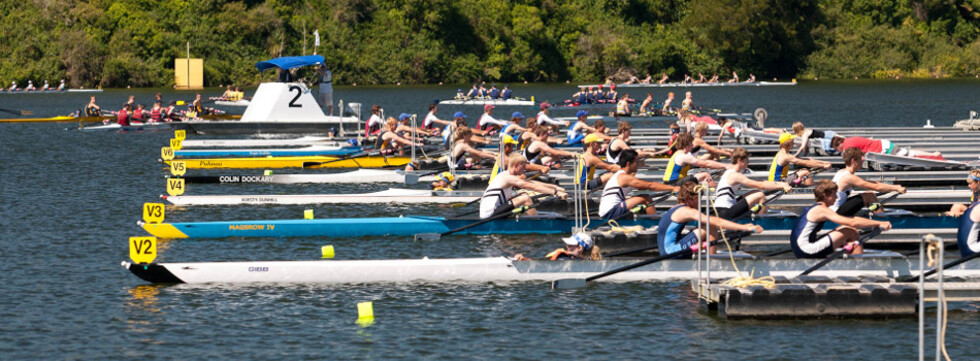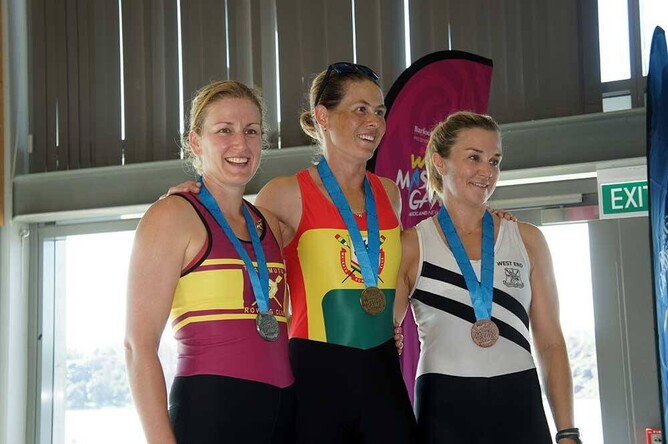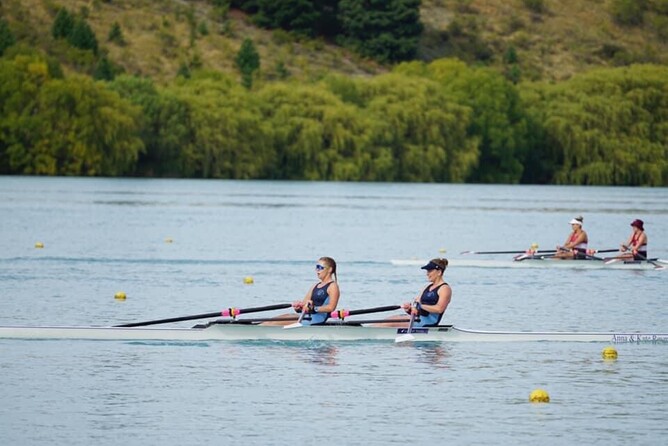Now we couldn’t finish this series without introducing you to the person whose done the work to make this series happen, Catherine Stapleton. Catherine has been a WRA committee member for the past 6 years and during her time, she has contributed to various projects such as rules of racing review, our constitution review, the WRA website, mental health training for clubs and Athlete Development Programme (aka Athlete Pathway).
Catherine is often behind the scenes working those evening hours because her young children and her business are her focus during the daylight hours. Her time constraints haven’t stopped her from getting involved and progressing key issues on behalf of the rowing community though.
We asked Catherine how she makes it all happen, as many often choose to opt out because life is too full and busy. She shared that "My parents made time to do this in their chosen sports when I was young so it is just what I know. My husband is also quite involved in school rugby, so instead of spending time watching TV or scrolling on social media, we choose to be involved. 1 hour of TV time each day, is 7 hours in a week. It just a matter how I choose to spend my time and what is important."
There are a couple of proud moments for Catherine in recent years. On the water it is winning a silver medal in the A single at the world masters games in 2017. Followed closely by competing at this year’s Club Nationals in Twizel. Off the water though it was representing the WRA at last year’s RNZ AGM which included a rules of racing review.
Photo source - facebook. 2017 World Masters Champs. Catherine is on the far left in Te Awamutu colours
Leading into the World Masters regatta held at Lake Karapiro, she had been on a journey that included getting her rowing fitness back after her first child, leaving her job to setup Stapleton Consulting Ltd and being the secretary for Te Awamutu RC. She recounted that:
“During the season I had put in the kms, did the club season with good results, and put in the effort behind the scenes coordinating the masters. In that moment when I received the silver medal, I was able to say I had done all that I could that season. Gold would have been great, but I put it all out there and silver was pretty good too. The pride and sense of satisfaction was immense."
Her training these days is a balance of 2-3x water sessions days depending on her husbands roster, and then 2-3x gym/crossfit sessions. She said "training now is quite a contrast to those BC (before children) days". She mentioned that “when time is a scarce commodity and there are little people with their own activities to work around, my focus is on quality training rather than quantity, and managing my energy levels”. Amongst her rowing crews she is known for her level head under pressure and wise words, but also her no-nonsense approach to training.
2022 Nationals Twizel - Catherine in bow with Jayme King stroke. Photo credit - Megan Glenn (CRC)
Off the water at last year’s RNZ AGM, she commented that “while the AGM had its challenging conversations with the Board and RNZ Management on topics like the Athlete Development Programme, it was a privilege for me to be speaking on behalf of the Waikato rowing community and working with the other association reps. That AGM showed what can be achieved when the Associations are talking and working together”.
Funnily enough she had no idea rowing existed at Cambridge High School until a family friend, who was also the coach, asked her dad to bring her along to the club. She said “it wasn’t quite love at first sight because I didn’t realise it involved early morning trainings before school. It instead grew on me and slowly become a priority over other sports. Winning several medals helped too.”
But when she left school and rowing, she forgot how much she enjoyed it until she started seeing crews training on the Brisbane River during her morning ferry commute. “I think if we stayed another year, I would have joined the club. I was also fortunate during my OE to be in Split, Croatia the same weekend as the annual Oxford, Split and Cambridge universities regatta. What an event and so many regatta memories came flooding back.”
There are only 2 women on the rowing association committee, and Catherine is one of them. Her, along with several women from other associations across NZ, are looking at ways to create a support network and pathways for more women to progress their rowing careers off the water. She commented “I was fortunate, that when I was involved in developing women’s rugby in the early 2000s, there were supportive men and women who gave me opportunities that others wouldn’t have due to my age. Overall, I have had similar support in rowing, but I don’t think I would have got this support if I hadn’t of spoken up and shown a desire to get involved.”
When it comes to her time on the association, she says it has been a mutual opportunity. While she has been able to serve the rowing community, she has learnt so much about rowing and been able to develop her leadership and governance skills. Associations are the regional voices for the local clubs and rowing community, and have the remit to improve the rowing experience through development initiatives. She mentions "there are a number of opportunities to have a direct influence on ideas and projects RNZ are contemplating at the moment and if anyone is considering governance roles in the future, the WRA is a good stepping stone."
In terms of a key life lesson rowing has taught her, she mentioned – “Courage”. Those hard training sessions and races are what have helped her exercise her courage muscles. This has carried over into her business or when she needs to speak up in a room full of people. She has found that courage is like a muscle. The more you use it the easier it is to step out of your comfort zone.
For anyone looking to give rowing a go or wanting to join the club committee but unsure of what it involves, she recommends that you take that first step, and find out more, then decide if you want to take the next step. Even if it doesn’t go well or if it is not for you, it is at least a chance to learn. This seems to be a consistent theme across most of our contributors to this series.
Where to from here for Catherine? Apparently after watching some inspiring men and women, like Tina Duff-Dobson still racing at the world masters in their 70s and 80s, she plans to still be rowing when she reaches that decade. Then there is the possibility one or both of her children take up rowing too. She also added that she would like to keep contributing to the rowing community through her role on the WRA and supporting other women who would like to contribute. She feels that it is time for more women to join in on the work that gets done to make rowing happen.


